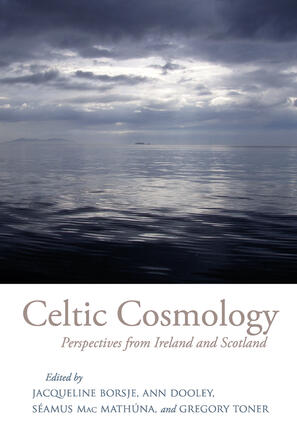
Celtic Cosmology
Perspectives from Ireland and Scotland
Description
From the deep sea to the waters above the sky, from the world beneath our feet to the promised land across the ocean - this volume represents a search for traces of cosmologies in Celtic sources, especially those of Ireland and Scotland. These cosmological traces are investigated for their Indo-European and Semitic parallels and influences. The broad world orderings - Celtic tripartition (earth, water and sky) and Christian bipartition (this world and the next) - are explored, and the cosmological meaning of specific demarcations in the landscape is analyzed. The world was mapped with words, as signposts for contemporary and future generations. These written "maps" are not only geographical, they also constitute ethical and mythological guidelines. Through storytelling, landscape and social space are processed in a framework of cosmic good and evil. In a Celtic mental world roads, rivers, mountains and hills are vital markers. Hills and caves were used in rituals and were seen as entrances to a subterranean otherworld where supernatural beings dwell and knowledge of the cosmos was believed to reside with these supernatural or subterranean beings. This knowledge is connected with protection and violation of the landscape and waters, and is often associated with the king, truth and justice. In the socialized landscape features of periphery and centre are closely related to kingship: thus, looming tragedy can be deduced from the route that a mythical king takes; royal capitals are outlined in landscape and architecture as ritual centres. The naming of significant places is a human act of creating order. In the Celtic literary tradition of explanatory and etymologizing stories, place-names serve as signifiers and warning signs (taboos) and some Celtic narratives on naming places appear to function also as performances of atonement for disruptions of the cosmic order.
Reviews
"The Greeks and Romans remarked on the knowledge of the druids concerning the workings of nature, and reverence for the Creator and delight in His creation are recurrent concerns of the religious poetry of medieval Ireland and Wales. In one Old Irish story, a saint and a visitor from the Otherworld discourse concerning 'the heavenly and earthly mysteries.' The essays in this learned, stimulating and accessible collection explore manifold aspects of the perennial preoccupation with the cosmos evinced by the Celtic peoples: the contents range from the Indo-European roots of the Celts to the riches of medieval Irish literature, and on to the Gaelic folktales and folkways of the recent past. With an exhilarating interdisciplinary breadth (including philology, mythology, archaeology, theology, folklore and literary studies), and deploying a masterly depth of expertise, the contributors have produced a volume whose interest is as comprehensive as its theme." - John Carey, University College Cork